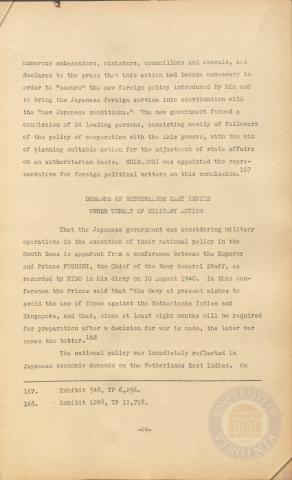
Page 69
| Parent | Japanese - German - Italian Collaboration |
|---|---|
| Date | |
| Language | English |
| Collection | Tavenner Papers & IMTFE Official Records |
| Box | Box 14 |
| Folder | Japan, Germany, Italy Collaboration and Introduction |
| Repository | University of Virginia Law Library |
numerous ambassadors, ministers, councillors and consuls, and
declared to the press that this action had become necessary in
order to "secure" the new foreign policy introduced by him and
to bring the Japanese foreign service into coordination with
the "new Japanese conditions." The new government formed a
commission of 24 leading persons, consisting mostly of followers
of the policy of cooperation with the Axis powers, with the aim
of planning suitable action for the adjustment of state affairs
on an authoritarian basis. SHIRATORI was appointed the repre-
sentative for foreign political matters on this commission. 167
DEMANDS ON NETHERLANDS EAST INDIES UNDER THREAT OF MILITARY ACTION
That the Japanese government was considering military operations in the execution of their national policy in the South Seas is apparent from a conference between the Emperor and Prince FUSHIMI, the Chief of the Navy General Staff, as recorded by KIDO in his diary on 10 August 1940. In this con¬ference the Prince said that "the Navy at present wishes to avoid the use of forcve against the Netherlands Indies and Singapore, and that, since at least eight months will be required
for preparation after a decision for war is made, the later war comes the better. 168
The national policy was immediately reflected in Japanese economic demands on the Netherlands East Indies. On
167Exhibit 548, TP 6,296.
168• Exhibit 1298, TP 11,718.
